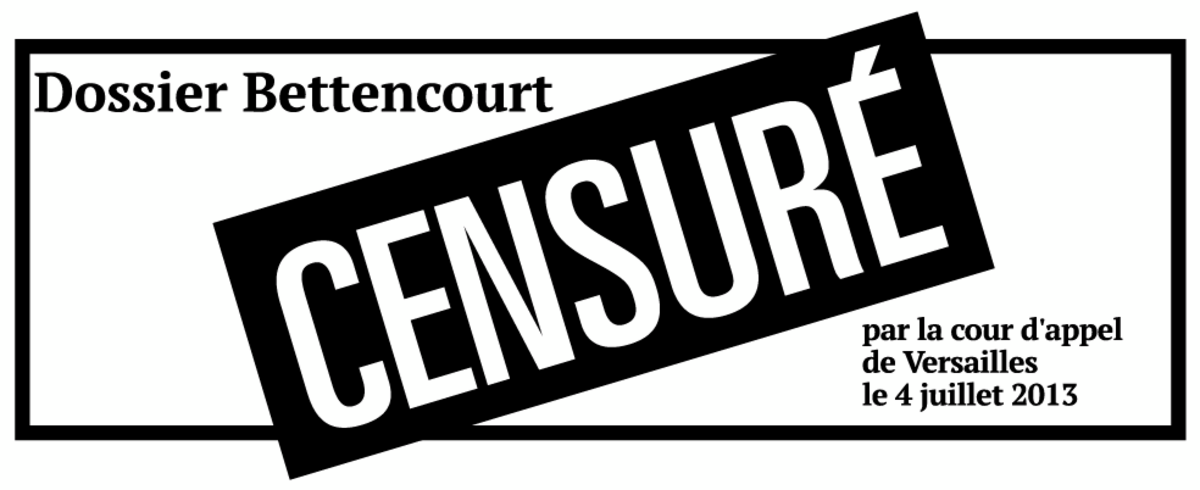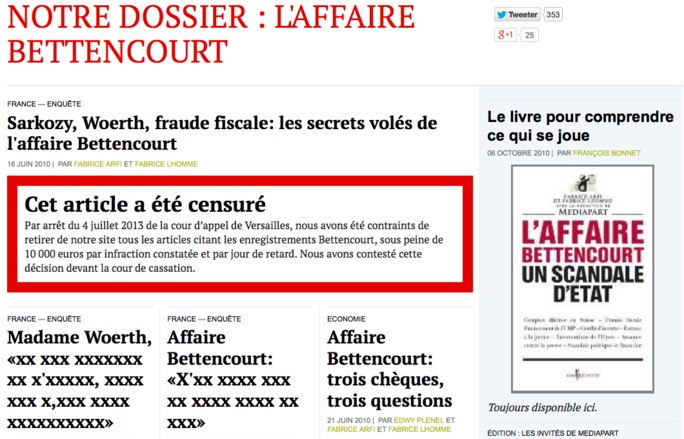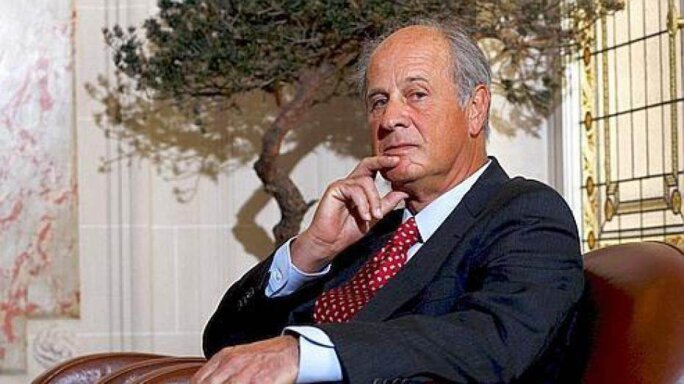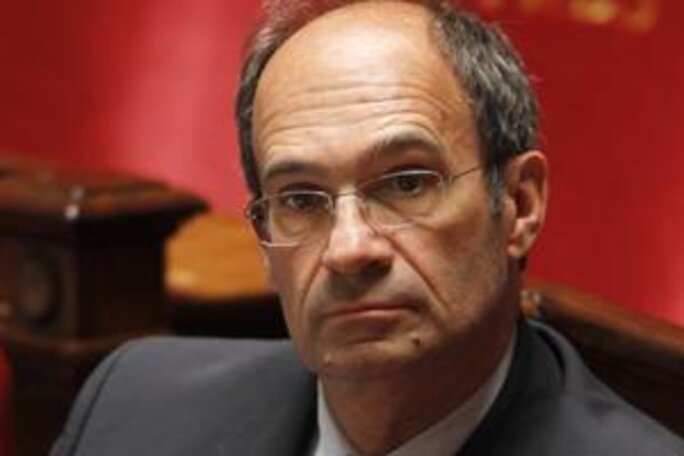The timing is bitterly ironic. On the same day that former president Nicolas Sarkozy was placed under formal investigation for 'active corruption' in a case arising from the wide-ranging Bettencourt affair, the French courts were deciding to “delete” the core of this very same Bettencourt affair from the press. This scandal, sparked by the revelation of secret recordings made by the Bettencourt family's butler, has led to a number of high-profile investigations and is, for example, the reason why former employment minister Éric Woerth and others are to stand trial next year on a range of charges. Yet on Wednesday July 2nd France's highest court the Cour de Cassation upheld the ruling by the court of appeal at Versailles on July 4th, 2013, censuring a whole series of articles by Mediapart on the Bettencourt affair that contained extracts from the tapes.
In the name of privacy, therefore, facts that are of public interest which were brought to light by the butler's tapes can no longer be directly quoted. Just like the Versailles court, the Cour de Cassation refused to strike a balance between the right to privacy and the right to know, ruling that the former must always take precedence. Therefore, according to the court, the publication of extracts from the recordings represents “a manifestly unlawful infringement, which cannot be justified by the freedom of the press or its alleged contribution to a public interest debate, or a concern to give particular credibility to information”. The ruling issued on July 2nd can be read, in French, here.
Faced with this anti-freedom decision, which marks the end of judicial recourse before the French courts, Mediapart has decided to take the case to the European Court of Human Rights. This court has developed an approach to the law that pays more concern to the citizen's right to know and the freedom of the press that its French counterparts.
In its decision on July 4th, 2013, following the application of the Bettencourt family and also Patrice de Maistre, Liliane Bettencourt's wealth manager, the court of appeal in Versailles ordered Mediapart to withdraw from its site all articles quoting from the Bettencourt recordings, or face a fine of 10,000 euros per infraction. The court said this covered “all or part of these recordings on all media, electronic, paper or others”.
Several days later Patrice de Maistre asked for the judgement to be enforced (though the Bettencourt family, clearly uneasy with this attack on freedom, did not). So on July 22nd, 2013, Mediapart complied with the ruling and masked the content of 72 articles containing quotes, re-transcriptions or extracts from the Bettencourt recordings.

Enlargement : Illustration 1

The full list of censored articles can be found here.

Enlargement : Illustration 2

This censorship, which is unprecedented in the digital era and which targeted an independent and reader-participative media, provoked a strong reaction from the public, political leaders and journalists, and led to the launching of an international appeal: “We have the right to know.” Nearly 60,000 people and more than 40 media titles, unions and associations signed it.
The appeal stated: “When it comes to public affairs, openness should be the rule and secrecy the exception. Making public that which is in the public interest is always legitimate, particularly when a secret is unjustifiably protecting injustices and crimes, attacks on the common good or abuses of human rights. In this way state security cannot be used as an excuse to stop revelations about breaches of individual freedoms, any more than protecting a person's privacy - a quite legitimate demand – can be used as an alibi for breaking the law.” A video of the press conference launching the appeal, with Reporters Without Borders and Quadrature du Net, can be seen here. At the same time, many press organisations copied the affected articles in their entirety, and they can be read on other sites.
By choosing to uphold the Versailles court's ruling, the Cour de Cassation – which has, incidentally, been shaken by the so-called Azibert scandal involving one of its senior judges Gilbert Azibert, ex-president Nicolas Sarkozy and his lawyer Thierry Herzog – considers that the protection of the right to privacy trumps all other considerations and, in particular, the public's right to legitimate information. Therefore a reactionary and restricted view of the law, and also one that protects the powerful and fraudsters, prevails over the new democratic imperatives of informing the public.
The Bettencourt affair's legacy
In fact, the Court of Cassation now finds itself in an awkward position in this affair. On January 31st, 2012, its own criminal division recognised that the recordings made by Liliane Bettencourt's butler Pascal Bonnefoy were admissible as evidence in the criminal investigation into alleged “abuse of weakness” that was formally launched in Bordeaux. In fact, the revelations from these recordings published by Mediapart from June 2010 onwards provoked a political and judicial earthquake that led to one of the biggest scandals of France's Fifth Republic.

Enlargement : Illustration 3

Four years later and the impact of this affair – which is still not over – is already considerable. Six judicial proceedings are in progress, the state has received tens of millions of euros in back taxes, the highest echelons of the state have realised the need to have better control of potential conflicts of interest and there have been reforms of political funding, while the revelation of the repeated pressure that Nicolas Sarkozy's Elysée put on the judicial system has highlighted the urgent need to develop the independence of the justice system.
Without these recordings, and without the publication of large extracts by Mediapart, this affair, monitored as it was by the Elysée and at one time suppressed by a prosecutor on the orders of the Sarkozy government, would never have seen the light of day. But the Cour de Cassation did not worry about this, and backed the Versailles court's broad interpretation of the right to privacy. Yet the details revealed in the Bettencourts' living room, where the L'Oréal heiress discussed with her wealth manager the strategies to carry out tax evasion, the transfers from hidden accounts in Switzerland, the illicit financing of political leaders and the pressures placed on the justice system, do they all relate to a person's private life?
For this reason Mediapart has, from the publication of its very first article on the subject, taken great care to explain that out of the 20 or so hours of recordings made by the butler, this site has just kept the equivalent of an hour's worth. Mediapart has ignored the recordings that relate to the inner family life of the Bettencourts, to various personal matters. Instead Mediapart has focussed on that which is at the heart of public debate: tax evasion and fraud, political funding, the working of the justice system and the potential peddling of influence.
The first judges who heard the complaints from Liliane Bettencourt and Patrice de Maistre respected press laws and in July 2010 found in Mediapart's favour; the same verdict was then handed down on appeal. However, these verdicts were overturned by the civil division of the Cour de Cassation which considered the right to private life to be an absolute principle, regardless of the context. This reasoning was followed by the court at Versailles, and has now been upheld by this latest and final decision of the Cour de Cassation.
Yet at the same time this meticulous journalism, which was carried out with due respect for the necessary protection of a person's privacy, has also led to a string of judicial proceedings. For it is on the basis of these recordings that the judges have carried out their investigations. As mentioned earlier, the results are there for all to see. For example, the former minister and ex-treasurer of the right-wing UMP party, Éric Woerth, has been sent for trial along with Patrice de Maistre on charges of 'influence peddling'. The court case is scheduled for March 2015.

During a separate investigation into another aspect of the Bettencourt affair Nicolas Sarkzoy was questioned by the investigating magistrate Jean-Michel Gentil, based at Bordeaux, then placed under formal investigation for allegedly abusing the frailty of the elderly Liliane Bettencourt. The case against Sarkozy was later dropped, but a total of ten people – including Woerth and de Maistre again – will stand trial in relation to this investigation. The others due to appear are: society photographer François-Marie Banier, Banier's partner Martin d'Orgeval, the notaries Jean-Michel Normand and Patrice Bonduelle, Carlos Cassina Vejarano,the former administrator of the Bettencourt’s Seychelles island, d’Arros, tax lawyer Pascal Wilhelm, businessman Stéphane Courbit, and Liliane Bettencourt’s former nurse Alain Thurin. The case is due to open on Monday January 26th, 2015, in Bordeaux, and is expected to last four to five weeks.
And this is just the judicial aspect of the Bettencourt affair, and does not cover the full scale of this immense scandal that overshadows Sarkozy's five-year term in office. By supporting censorship and ignoring the demands of a democracy the Cour de Cassation has turned the defence of privacy into an excuse for protecting the government of the day, its crimes and its corruption. It is this “unjust justice” that Mediapart intends to denounce before the people and in front of the European Court of Human Rights.
---------------------------------------------------------------
- The French version of this article can be found here.
English version by Michael Streeter
.


